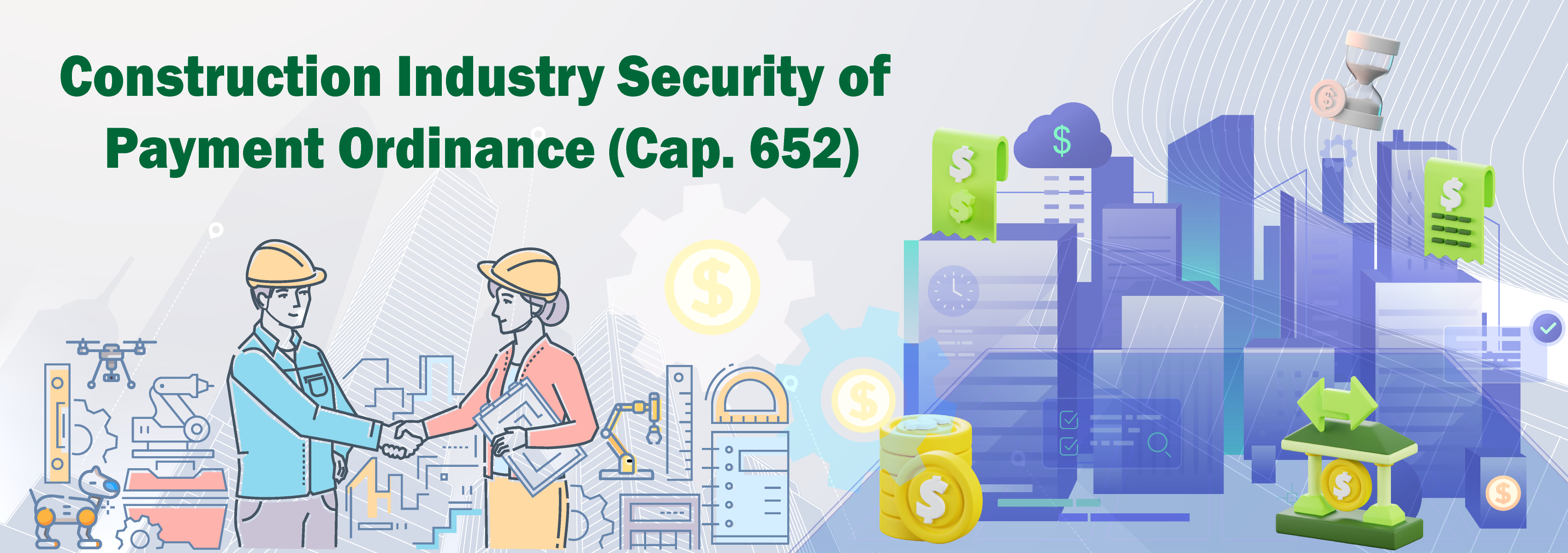

Introduction
Purpose
The Construction Industry Security of Payment Ordinance (the Ordinance) aims to improve the longstanding payment problems in the construction industry and provide better protection for the stakeholders in the supply chains of the construction industry to receive their entitled payment on time, while also seeking to help reduce occurrence of wage arrears of workers.
The Ordinance was gazetted on 27 December 2024, while the power of the Secretary for Development for registration and administration of Adjudicator Nominating Bodies (ANBs) has been taken effect on the gazettal date, the remaining provisions of the Ordinance will come into operation on the expiry of eight months (i.e. 28 August 2025). Construction contracts entered into on or after that date will be governed by the Ordinance.
Key Features
(1) Improvement of Contract Payment Terms
- Prohibits the use of “conditional payment"1 terms such as “pay when paid”
- The paying party is required, on the date specified in the contract or within 30 days of receipt of the payment claim2 ,whichever is earlier, to serve the payment response3
- The paying party is required to pay the amount admitted in the payment response in full within the date specified in the contract or within 60 days of receipt of the payment claim, whichever is earlier
- In the event that the contract has not specified how and when progress payments are to be made, the claiming party is entitled to make payment claim on the last day of each month for the construction work carried out or the related goods or services provided in that month
1A “conditional payment” term is a provision that makes the liability of a party to pay money owing to another party under a contract contingent or conditional on receipt of payment under another contract (usually an upper-tier contract) (i.e. “pay when paid”), or other provisions having the same effect. “Conditional payment provisions” are also prohibited in nominated subcontracts. In addition, even if the non-payment is due to the bankruptcy of an upper-tier party in the supply chain, such “conditional payment provisions” remain unenforceable.
2Requirements for a payment claim
(1) be in writing;
(2) identify the construction work or related goods and services to which the payment relates; and
(3) state the claimed amount and how the claimed amount is calculated.
3Requirements for a payment response:
(1) be in writing;
(2) identify the payment claim to which it relates; and
(3) state the amount the paying party admits to pay (admitted amount), the difference between the claimed amount and the admitted amount and how the admitted amount is calculated.
(2) Adjudication Mechanism
- The claiming party has the right to initiate adjudication proceedings within 28 days of the payment dispute4 arising
- The Adjudicator Nominating Body5 must appoint a suitable adjudicator6 within 7 working days
- The adjudicator must make a determination within 55 working days from the date of appointment; if both parties agree, the 55-working day period can be extended
- Parties are jointly and severally liable to pay the adjudication costs7 in the proportion as decided by the adjudicator
- If parties are dissatisfied with the adjudication determination, they have the right to refer the dispute to arbitration or litigation
- The claimant may apply to the Court for enforcement of the adjudicator’s determination after the expiry of the payment deadline of the adjudicated amount
4Under the Ordinance, a payment dispute is deemed to have arisen in following three circumstances: (1) when there is a payment claim, the paying party fails to serve a payment response on or before the deadline; or (2) the paying party, in response to a payment claim, disagrees with the amount claimed to be payable by the claiming party; or (3) the paying party responds to the payment claim and admits that there is an amount due but fails to pay the admitted amount in full on or before the deadline.
5A register of Adjudicator Nominating Bodies established by the Development Bureau. For details, please refer to the Development Bureau’s website.
6Adjudicators are qualified professionals with experience in handling construction contract disputes such as engineers, architects, surveyors and lawyers.
7The Ordinance provides that the Secretary may regulate the fees of adjudicator nominating bodies and adjudicators. The Development Bureau will specify a reasonable upper limit on the fees in the application guidelines for registration as an adjudicator nominating body. For details, please refer to the Development Bureau’s website.
(3) Suspension or Reducing the Rate of Progress
According to the Ordinance, for two specific conditions, viz
- The paying party has admitted an amount payable but fails to pay the claiming party the admitted amount in full by the payment deadline; and
- The adjudicator has made a determination on the payment dispute but the respondent fails to pay the claimant the adjudicated amount in full by the deadline specified by the adjudicator
Subject to fulfilment of the requirements8 of the Ordinance, the unpaid party has the right to suspend or reduce the rate of progress for carrying out work or supply. He/she is also entitled to a reasonable extension of time to complete the contract and to recover from the paying party any loss and expenses that have reasonably been incurred.
8The unpaid party shall serve a notice of intention on the paying party/respondent and notify the owner at least 5 working days before the intended starting date of exercising the right to suspend or reduce the rate of progress.
